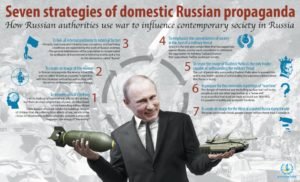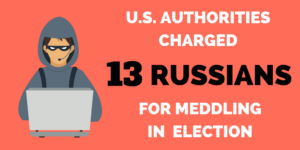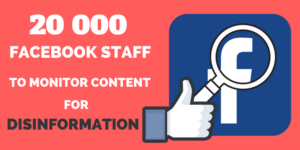
Credit: Economist
Russia has firmly established itself as a democratic society following the path of freedom and independence, Russian President Vladimir Putin said – without a trace of irony – in his annual State of the Nation Address to the Federal Assembly on Thursday.
In fact, democracy is what scares Putin the most, argues analyst Daniel Hoffman. Putin wants his presidential election in the fog of a Potemkin village, where the process appears to be fair, but in fact there are no real challengers to his autocratic rule, he writes for The Cipher Brief:
Putin has harassed opponents by falsely declaring them a fifth column doing the bidding of Russia’s external enemies. We should expect protests more intense than during Russia’s presidential election of 2012, which the Russian domestic election monitor Golos and Organization for Security and Cooperation in Europe (OSCE) election observers condemned as fraudulent.
 The Kremlin is “deadly serious about the cyber warfare he is so effectively waging,” he adds. “Putin’s strategy is ruthlessly focused on shaping our political discourse by simultaneously supporting extreme, antithetical positions.”
The Kremlin is “deadly serious about the cyber warfare he is so effectively waging,” he adds. “Putin’s strategy is ruthlessly focused on shaping our political discourse by simultaneously supporting extreme, antithetical positions.”
To counteract Russia’s behavior, the West must understand the Kremlin’s use of information warfare as an example of a chaos strategy in action, and detach itself from its current focus on social media and IT-heavy analysis, say Peter B. Doran and Donald N. Jensen of the Center for European Policy Analysis (CEPA).
U.S. policy must remove the predictable and permissive conditions that enable a chaos strategy in the first place. Second, it must conceive of and work toward a sustainable end state in which Russia returns to “normal” strategic behavior patterns. Here are four key actions that policymakers must take if they are to accomplish both goals, they write for The American Interest:
- Realize that Russia sees the international system very differently than we do, even though our interests on specific issues may coincide (for example, counter-terrorism).
-

eu vs disinfo
Approach our dealings with Moscow with the understanding that its use of terms like “international law” and “state sovereignty” are quite different than ours, and that Kremlin leaders evoke these concepts for ad hoc advantage—not as ends in themselves.
- Understand that Russia’s use of information warfare has a purpose: reflexive control. (Such control is achieved by subtly convincing Russia’s opponents that they are acting in their own interests, when in fact they are following Moscow’s playbook.)
- Prioritize the sequencing of the “carrots and sticks” offered to the Kremlin. Sticks first. This means initially increasing the penalties imposed on Russia for continued revisionist behavior and sowing of chaos (for example: tougher sanctions, wider travel bans, greater restrictions on access to the global financial system, financial snap exercises).
 Ukraine is the perennial disinformation target, the EU Stratcom Task Force’s Disinformation Review notes, highlighting the disinformation narratives we have seen this week in chronological order:
Ukraine is the perennial disinformation target, the EU Stratcom Task Force’s Disinformation Review notes, highlighting the disinformation narratives we have seen this week in chronological order:
- Firstly we notice the narrative that the events in Ukraine were initiated by a Western-backed coup. This is a recurring pro-Kremlin disinformation theme. …
- Secondly, we find the disinformation narrative that tries to blame anyone but the Yanukovych government for the killing of unarmed protesters during a couple of dark days in February 201…
- Thirdly, we see disinforming narratives about the illegal annexation of Crimea spread again, claiming that Crimea is Russian territory, that Crimea smoothly separated from Ukraine or that Crimea simply “reunited” with Russia in 2014. In fact, Russia illegally annexed the Ukrainian peninsula in violation of international law.

DISINFO EU STRATCOM
Russia has launched similar disinformation warfare against other democracies in recent years, including Germany, France and the U.K, adds Princeton University professor Sean Wilentz.
For democrats to effectively counter authoritarian active measures, “we have to start thinking holistically about a media system which actively engenders disinformation, and where all campaigns smooth the pathways for each other,” argues Peter Pomerantsev, a director of the Arena Program at the London School of Economics. Disinformation won’t be curbed until the very model which produces it is altered, he writes for The American Interest:
It seems that the only way to cure hyper-targeted deception is a more ethical hyper-targeting. There’s no return of the old, Enlightenment, allegedly evidence-based and supposedly rational “public sphere,” with its related geography of “domestic,” “foreign,” and “global” spaces. Instead there are permutations, some using language more accepting, others more “polarized” and dehumanizing, of that semi-trance like state you enter into when online, where the definitions of public/private, foreign/domestic, and real/unreal fall away. RTWT

DFRLab
A source told THE WEEKLY STANDARD that a significant chunk of the $40 million Information Access Fund announced Monday would be used to push back on Russian disinformation in particular. A State Department official said the exact figure was classified, but that “we are focused on countering Russian disinformation and propaganda.”
Europe’s current debate on Russia is solely focused on what Russia lacks – democracy, rule of law, modernization – and there is a tendency to try to view Putin’s Russia as a paperback edition of the Soviet Union. At the same time, Russian public debate is far from immune to conspiracy theories in trying to explain the changes in the modern world, according to Eurozine [a partner of the National Endowment for Democracy, the Washington-based democracy assistance group]:
There is an urgent need for re-engagement between Russia’s debate on the directions of the world and Europe’s debate on the choices that Russia faces. With Russia’s recent return to power politics, and the fears of a new Cold War this has resurrected in the West, the situation is more acute than ever. The focal point “Russia in global dialogue” is an attempt to answer this need.







